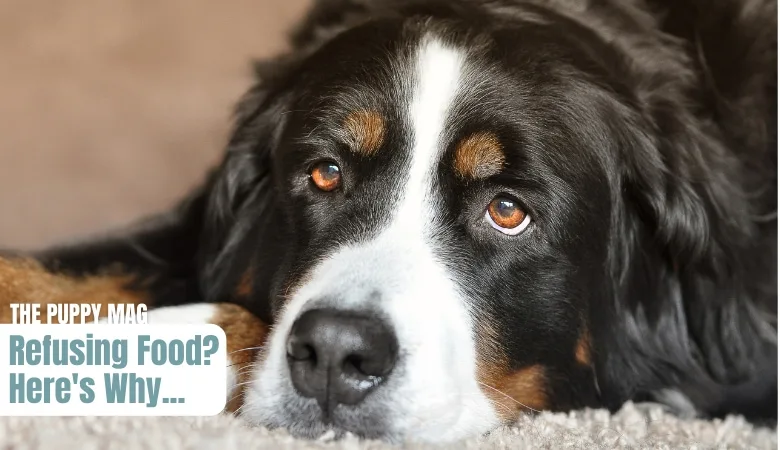I know it can be quite worrying if your Bernese Mountain Dog starts refusing their food. I’ve had to deal with this a few times with my own dogs and I’ve learned quite a bit along the way.
This article covers everything on this topic I wish I knew from the start.
All of this will be explained in full detail below, and what you can do about it.

5 Reasons Your Bernese Mountain Dog Won’t Eat
If your Berner refuses his food, it will likely be due to one of the reasons below. After reading through each major reason, you will have a good idea as to what it is.
1. His Stomach Disagrees With His Kibble
This is one of the most common reasons why Berners start refusing their food. While not all Berners have sensitive stomachs, a good proportion of them do. This makes finding a kibble that works well for them a difficult task.
Bernese Mountain Dogs with sensitive stomachs would likely benefit from avoiding common allergens and irritative ingredients.
- You may be surprised to know that chicken, beef, lamb, and pork are all common allergens and cause digestion issues for many dogs, despite being the most popular forms of protein.
There are still many other ingredients that cause digestion issues among sensitive breeds. This includes soy, corn, wheat, eggs, and dairy, as well as other additives and preservatives which should already be out of the kibble anyway.
While some other breeds will chomp down anything put in front of them again and again, Berners are smarter than that. If his food starts to make him feel bad, he’ll be quick to refuse it the next time around.
2. He’s Become Bored With His Food
Sometimes there is nothing wrong with his kibble or how he’s digesting it, he’s just bored of it.
If boredom is to blame, it usually happens gradually instead of suddenly. Gradual disinterest in his food may happen over an entire month or even less.
Admittedly, boredom is the hardest cause to diagnose, as it can happen randomly for no reason.
- With boredom, you won’t have any other negative side effects like diarrhea, runny stools, or vomiting leading up to the food refusal.
It’s often pointed out that dogs can become “bored” or “unwanting” of their own food if they frequently receive tidbits throughout the day. Continuous treats and table scraps will make his own food less appealing to him.
3. He Isn’t Receiving Enough Exercise
Bernese Mountain Dogs are large and stocky, and their appearance typically leads people to believe they don’t require much exercise. Well, this couldn’t be further from the truth.
Berners need at least 1 hour of exercise per day. Bernese Mountain Dog’s in their prime years (2-7) will be more than capable of 1-2 hours of intensive exercise and running around per day.
Exercise burns calories and keeps his body’s metabolism going throughout the day, this is a simple, but essential part of developing a healthy appetite.
- If your Berner spends most of his day laying down or not moving enough, his metabolism will eventually slow right down and his body won’t need much fuel (food) to keep up his current routine, leading to low appetite.
This likely isn’t an instant change, but it can be over the course of weeks.
4. He Isn’t Sticking To Strict Mealtimes
If your Berner is currently grazing throughout the day, or you are leaving his food bowl down and topping it up when it looks low, you’ll never really know how much he’s eaten.
Your Bernese Mountain Dog should be eating twice per day, once in the morning when the household wakes up, then again in the evening around 6 pm. Set your times, and then stick to them religiously.
The biggest benefit of this? you are training your Berner to be hungry at those times. After a few weeks of the same mealtimes, his body will be hungry and ready to eat as dinner time approaches.
5. He Has Underlying Health Issues
In more unfortunate cases, he may not be eating due to an underlying health concern.
Having a lack of appetite or completely refusing food can be a symptom of a vast amount of health concerns.
Underlying health issues usually present other symptoms like vomiting, diarrhea, appearing weak, or having a lack of energy or motivation.
But It must also be said that some underlying health issues may present no apparent symptoms, so even if your Berner would otherwise seem fine, it’s still a good idea to rule out health issues with your Veterinarian.
This is original content produced and published by The Puppy Mag | www.thepuppymag.com

Psst! A quick word on training. So many owners are praising Brain Training For Dogs we’ve got to mention it. Owners report improved obedience and behavior quicker than anything else they’ve tried. So we definitely advise checking it out!
What You Can Do To Help Your Berner Start Eating Again
The first and most sensible thing to do is rule out health concerns with your veterinarian. After that, the following tips should help you get your Berner eating again.
1. Use a premium brand of kibble
In the world of dog food kibble, there are many debates about what’s a good brand, what isn’t, and the same goes for the ingredients.
One of the best websites to go by for honestly reviewing dog food is the Dog Food Advisor. Their rating system is one of the fairest in the industry, they advise on recalls, and they highlight any controversial ingredients. So you can check your brands on there before buying.
Highly recommended premium kibbles:
Orijen Six Fish Premium Dog Food
(avoids chicken, beef, lamb, and pork)
Acana Singles Limited Ingredient
(limited ingredient)
Taste of The Wild Pacific Stream
(avoids chicken, beef, lamb, and pork)
Merricks Limited Ingredient
(limited ingredient)
The recommended options are either limited ingredients and/or use fish, duck, or turkey as their main protein source. This alone will significantly contribute to easier digestion.
2. Stop The Tidbits or High-Calorie Treats
Treats are an important part of any dog’s life, I fully agree with that!
But it’s important to stick to low-calorie dog treats.
It’s time to stop the tidbits, table scraps, and leftovers. Not only are these very filling and can ruin your Berners’ appetite, but these tastier snacks may make his real food seem boring enough to leave.
Treats only need to be tiny morsels, and they should only be used when he deserves it, like throughout training.
Highly recommended low-calorie treats – Zukes Mini Naturals Duck Just 3.5 calories per treat!
3. Incorporate Wet Dog Food With His Kibble
Something that veterinarians have long recommended is to follow an 80/20 split. Meaning to split meal times 80% dry kibble with 20% wet dog food.
Wet dog food is in a different league from dry kibble when it comes to, well, pretty much everything. It’s far more nutritious, it has a lot more protein, it contains far fewer additives, preservatives, and nasty stuff, plus it’s seriously tastier.
Mixing in a small amount of wet dog food will add a boost of nutritional variety and will make his food irresistible to him.
If your Berner is near the mark when it comes to his weight, you may only want to incorporate wet dog food a few times per week as opposed to every mealtime. It contains quite a lot of calories.
⭐ Recommended wet dog food: Purina ONE Grain-Free Natural Smart Blend
4. Rotate His Kibble Every Two to Three Months
A great way to prevent outright boredom is to follow the rotation diet. It’s a super simple concept but it works very well.
All you need to do is have two different kibbles you know your Bernese Mountain Dog likes and gets on well with, then rotate them every 2 or 3 three months, for quite some time.
This changes the flavor and keeps him interested in his food. 2 to 3 months is not a long time for your Berner to stick to one food, so this change will surprise him and keep his taste buds happy.
To reduce digestive issues, most people stick to the SAME brand and variation of kibble but just switch up the flavor. This keeps the majority of the ingredients the same, avoiding upset stomachs.
5. Stick To Proper Mealtimes
I mentioned this earlier, but it needs to go here too.
Create mealtimes, and stick to them. 7 am or 8 am when your household wakes up, then again at 6 pm is are the ideal times.
Whatever times you create, don’t miss them! Stick to them and after a few short weeks your Berner will adjust to those times and will naturally work up an appetite as mealtime approaches.
Recommended read: Do Bernese Mountain Dogs Drool? (And Why)
6. Time-Restricted Eating
The last approach you can take is for fussy eaters. This method is only recommended if you strongly suspect your Berner is just being very picky, but otherwise fine and healthy.
This method involves putting his food down at his mealtimes and then removing it after 5 or 10 minutes.
I personally think 5 is not long enough so I say 10. If your Berner didn’t finish his meal in 10 minutes, tough luck, until next mealtime. This method has been known to cure fussy eating for up to several months, after just one or two removals…
By the next mealtime, your Berners’ survival instincts to eat will be awakened and when you put the food bowl down he’ll know he needs to eat it now with no messing around.
It’s recommended to only do this two times in a row if needed, by the third mealtime you should already be ready to call your veterinarian.
Many people ask if doing this is safe, and the response from veterinarians is that “no healthy dog, will voluntarily starve themself” so it appears that it is.
But once again, this tactic is only to be used if you suspect fussy eating. If he has an underlying health concern, this is not the way to go and your veterinarian should be called from the get-go.
When To Call Your Veterinarian
If your Bernese Mountain Dog has refused his food for 2 days straight, it’s time to visit your veterinarian.
From the moment your Berner starts refusing his food, it’s crucial to observe fluid intake. Even if your Berner refuses food, you should encourage him to continue drinking.
Not eating is one thing, but refusing to drink is a more serious situation.
If you can’t get your Berner to drink anything for a single day, you should already visit your veterinarian.
Popular Bernese Mountain Dog Articles:
Why Do Bernese Mountain Dogs Live So Short?
Can Bernese Mountain Dogs Run With You? Tips, Advice, Gear
Can Bernese Mountain Dogs Be Left Alone?
Final Thoughts
So there you have it, you now know of 5 main reasons why your Bernese Mountain Dog is refusing his food, plus you have 6 great ways to combat this issue.
Remember, it’s always advised to rule out health conditions first with your veterinarian. Having a lack of appetite is a common symptom for a lot of health issues, so this should be a priority.
After that, you can try the following tips and tricks outlined above.
Back to more Bernese Mountain Dog articles >>
